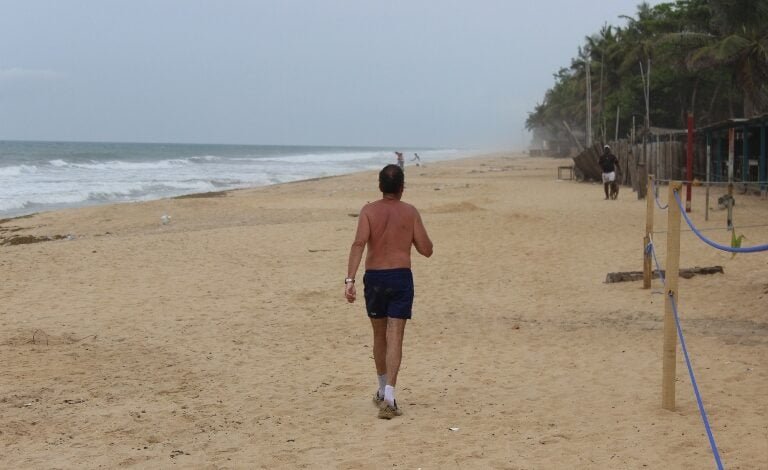Ivory Coast: After the Attack, Grand-Bassam

Holds on to Its Economic Recovery
On March 13, 2016, the seaside resort of Grand-Bassam (40 km South East of Abidjan) experienced with Ivory Coast its first ever deadly attack. It remains difficult to recover. Past the initial shock, things are falling back into place in Grand-Bassam. Recently, on April 30th, despite a gloomy economic backdrop, a commemorating horse race was organized, in the France neighbourhood, where are located most of the city’s hotels.
We observed Grand-Bassam on two occasions, a Saturday and a Tuesday, in order to detect or not a reprisal in activities. At the road station, usually bustling with people, city-taxis can hardly find customers, which is very telling. The March 13th attack which officially killed 19 people and injured 33 others provoked a serious slowdown in the economic activity of this tourist site listed as UNESCO World Heritage.
Restaurants, Transportation, Small Shops… Total Loss
On this Saturday, April 23rd, we meet Aboubacar Sidick also known as Abou Bassam, the Manager of a restaurant in Azzureti, a few kilometres away from Grand-Bassam. He says: ‘It’s a serious blow for the
economy of the city. A lot of restaurants are now closed. It’s hard. People are still scared.’
His restaurant, ‘L’Étoile Tiémé’ was, before the attack, making between XOF 1 and 1.6 million in revenues per month. Specialized in African, European and Moroccan dishes, the place was an oasis of quiet away from the action of Grand-Bassam, where customers could indulge in delicacies for XOF 5000 or 6000 a dish.
‘When the attack happened, I had nine Dutch customers at the table. Today, the restaurant is closed, it is no longer profitable, as with the other beach restaurants. At the moment, only “L’Étoile du Sud” can rejoice over its earnings’, says Sidick.
‘L’Étoile du Sud’ is the hotel next to which the killings started. Advertising and communication campaigns centred on accommodations had an effect. On this Saturday, 23rd of April, the place is crowded thanks to a wedding ceremony.
The Beach Spoiled by Seaweed
For two taxi drivers met in town, the negative impact of this attack is evident. ‘It will take a whole year for Grand-Bassam to recover economically from this. Nothing is well,’ says the first one without wanting to disclose his identity. The second, slightly older, anticipates it will be forgotten in six months.
‘Espace Blankson béni de Dieu’ is another restaurant not far from ‘L’Étoile du Sud’. The young woman tending the tables is hopeless. Clients are scarce and it shows. The loungers, tables and chairs that used to be always busy are now empty.
‘Before March 13th, on any given Saturday, I would sell at least 20 chickens for the price of XOF 6000 each. Sundays, between 50 and 60. Today, I can merely sell three,’ she says.
Idrissa, a young Senegalese salesman, well-known on the Grand-Bassam beach for his display of pairs of glasses, expresses the same concerns.
‘Before, between 10 am and 12 pm on a Saturday, I would sell 40 pairs. Now, I struggle to sell around ten,’ he says while walking back and forth under the blazing sun.
Assane has sold artisanal necklaces and other jewels for the past 20 years on this beach. ‘Before this attack, necklaces and pearls were good sellers. I’d close the day with XOF 25,000 in my pockets. The articles are priced between XOF 1000 and 1500. Since this event, I have had too many times only one customer buying one article for XOF 1000’, he says.
Anticipating this predictable outcome, the government announced on March 16th, during a cabinet meeting that took place in the former colonial capital, a release of funds totalling XOF 300 million to support
economic operators of the seaside. The money was released, but its distribution would remain problematic, according to a few operators we met.
Hotels Waiting for Customers
On Tuesday, April 26th, the Wharf Hotel in Grand-Bassam is empty or almost. Hotel Manager Lassina Ouattara says, ‘we have all been victims of the attack. The damages have been minimal here at our hotel. But the economic impact on our business is evident; our operations have dramatically dropped’. The cause is simple for him: ‘People are still afraid, even though Grand-Bassam has now become by necessity, the most secure place in Ivory Coast.’
‘Five seminars had to be cancelled following the attack,’ he says. Since the March13th events, the first seminar part of the National Programme for the Fight Against AIDS was held at the Wharf Hotel on April 26th. The Wharf Hotel offers 39 single rooms and suites that are almost all vacant today. The cost per night varied between XOF 30,000 and 70,000. There is also a fully equipped beach and a swimming pool. ‘Until March 13th, everything was going smoothly, with an occupation rate of 80% and the beach was full with people. Now we have nothing,’ says Lassina.
The economic impact on this hotel was so strong the management had to consign to technical unemployment part of the staff. ‘Since April 25th, employees are back to work but only on May 1st did the ten employees temporarily laid off reintegrate their functions,’ says the Manager. Lassina Ouattara is pleased with the increased security and the marketing campaign organized. He’s confident that from mid May ‘business will pick up again’, but in the meantime, ‘it is dead calm’.
To reassure people, the organization of hotel and restaurant owners of Grand-Bassam (Horest) participated in the recent Tourism Fair of Abidjan (Sita 2016). ‘We are asking everybody to come back to Grand-Bassam, where security is ensured,’ concludes Lassina Ouattara.





